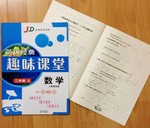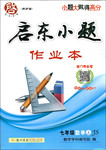题目内容
阅读理解
The aim (目的|) of students who come to school is to study. But to study needs a right way, or we would waste the time or the money. The following are ways of studying.
The best time for reading is morning. Because in the morning, the air is fresh and our minds are clear. For that reason, we can get good results.
In studying we must be patient (耐心的). If we don't understand a text well, we must read it again. We should not read the next one till we have learned the first one well.
When we are studying, we must put our hearts into the book. We can not read absent-mindedly (心不在焉地) , or we can get nothing from the book while we are reading.
We must always ask “whys”. If it is not well understood, write it down and ask our teachers or parents, brothers or friends, in any possible way. We must know it completely and then our knowledge can be used well.
Though there are many ways for studying, however, the above mentioned (提及的) will be quite enough if we can keep them in heart and do so.
(1) The article tells us ________.
[ ]
A.to read in the morning
B.to pay attention to ways of studying
C.the importance of reading
D.to have patience in studying
(2) This article has taught us ________ ways of studying.
[ ]
(3) We'd better read in the morning because ________.
[ ]
A.it is difficult to get good results
B.the air is fresh and our minds are clear
C.it is easy to remember what we have learned
D.both B and C
(4) If we can't put our hearts into the book when we read, it is ________.
[ ]
A.possible to learn something from it
B.easy to understand it well
C.impossible for us to get something from it
D.hard to get something from it
(5) In studying, we must always ask “whys” in order to ________.
[ ]
A.understand the book well
B.get some questions to ask our teachers
C.do with the new words
D.write down the questions
解析:
|
整体把握:本文主要讲述四种学习方法:最好在早晨读书;学习必须有耐心;我们读书时要一心一意;在学习中,我们必须不断问为什么。 (1) 点拨:本文主要讲述学习方法,故选B。 (2) 点拨:通读短文可知,本文共告诉我们四种学习方法。 (3) 点拨:最好在早晨读书的原因在第二段第二、三两句,故B、C均符合题意,因此选D。 (4) 点拨:如果我们读书时不专心,要学会知识当然是不可能的。故选C。 (5) 点拨:在学习中,不断问为什么,其目的是为了更好地理解。 |

 黄冈经典趣味课堂系列答案
黄冈经典趣味课堂系列答案 启东小题作业本系列答案
启东小题作业本系列答案
| |||||||||||||||||||||||||||||||||
| |||||||||||||||||||||||||||||||||
| |||||||||||||||||||||||